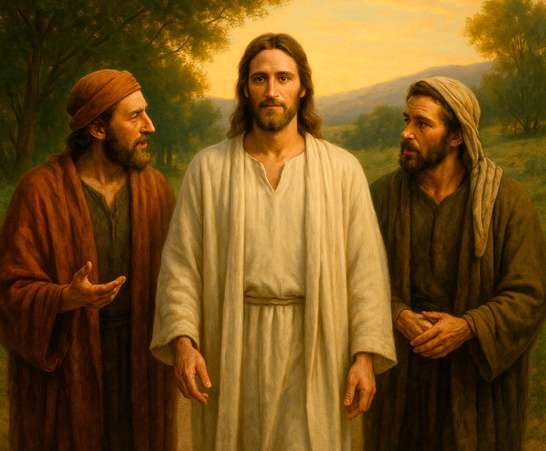My reflections on the Gospel of Jesus Christ according to Saint Luke, chapter 24
Difficulties bring down the weak but strengthen the strong. In the Gospel of Luke, chapter 24, we see the disciples on the road to Emmaus returning to their former lives, trapped in their weaknesses and disappointments. The Word of God, although uncomfortable, is necessary because it makes us see everything that hinders our journey. The Old Testament was not abolished but fulfilled and perfected in Christ. Yet, so often, we are so full of the past—and thus paralysed—or so anxious about the future that we stop living in the present.
The disciples on the road to Emmaus were immersed in disappointment, and disappointment makes us live trapped between yesterday and tomorrow, unable to move forward. They were frustrated because they wanted Jesus to be the Messiah in the way they expected, according to their own desires. How many times have we too felt disappointed with God because He didn’t act exactly as we wanted? God tests us because He knows we tend always towards the Law of Least Effort.

We cannot allow ourselves to become paralysed in the face of disappointment, for people and things will inevitably disappoint us. Disappointment, if not overcome, blinds us. Some people, wounded, end up closing in on themselves and punishing others because of their own pain.
Daily life is meant for walking and overcoming obstacles, never for living trapped in the past, for we cannot turn back. Jesus walked with those disciples, breaking bread—a profoundly symbolic gesture.
Bread represents nourishment for the mind (psyche), the body, and the soul—three dimensions of our being that are not whole and therefore need to be nourished. Christ offers us this nourishment little by little. The disciples returned to the Church because it is within the ecclesial community that faith is strengthened—both ours and that of others. Jesus persisted with them, because He never goes back on what He offers and never discards those He has chosen. He needs the testimony of the disciples so that all may know that He has risen and walks alive among us.
No one advances without others to guide them, for this is God’s great invention: wherever there is a man or woman who believes and prays, God acts there and transforms hearts. This mission belonged to our grandparents, then to our parents, and now it is our generation’s turn. If husband and wife fail in their mission, the whole family can collapse. We are responsible and need to embrace our vocation and mission. Christ warns us that our life will be lost if we simply leave everything as it is. Do you want God to appear in your life? Talk to Him. The walls of our homes should be filled with blessings, not our complaints.
On the lid of the Ark of the Covenant were two cherubim, and Jesus appeared between the two disciples on the road to Emmaus, walking with them for eleven kilometres, in a symbolic parallel to the Ark of the Covenant. God manifests Himself where He is welcomed, where He is adored. When He speaks, it is not merely words but reality. He balances our lives, for as long as we are unbalanced, we cannot receive His blessings. The disciples did not recognise Jesus straight away because they were caught in a state of indecision, moving back and forth, taking one step forward and another backwards, and so getting nowhere. Anxiety achieves nothing; on the contrary, it paralyses. The desire to move forward in a disordered manner only leads to accumulating problems. Living between dreams and traumas is to live in this confused movement. What we lack is trust.
When life presents us with its sharp blades, we often retreat, and this causes us to expend energy and feel exhausted, as if we were achieving nothing. We need to throw ourselves into the Lord’s arms and trust, even if we see no signs. We must open paths and not look back. Many may say it is foolishness, but the truth is that courage is required. And courage is not violence; it is the awareness that we will have to fight.
Why do we allow doubts to grow in our hearts? We are capable of controlling our thoughts. Can we doubt what we already know for certain? Do not let doubt take the place of the certainties that God has already inscribed in your heart, for a heart that doubts is a paralysed heart. And paralysis is the first stage of death; necrosis, the second.
We must place everything in the Lord’s hands and entrust our faith to Him. Jesus asked the disciples on the road to Emmaus whether they had any food, and they replied that they had fish, but they lacked bread. Where was the bread? When bread is missing, man becomes paralysed. Then Jesus opened their innermost being. Our inner self closes up in the face of fears and difficulties, but the Mass allows us to receive spiritual bread and to renew our trust to face the challenges that lie ahead. We are compared to sheep not only because of sacrifice but because, without a shepherd, sheep do not feel safe, do not eat, do not drink water, and end up wasting away.
